Finance Minister Nirmala Sitharaman will present the budget on the Parliament on February 1, 2023. With the approaching central elections, popular consensus on this year’s budget is that it would be growth-oriented, with a focus on infrastructure, inflation, manufacturing and rural economy

The Indian retail sector is expected to grow to $ 1.5 trillion by 2030 because of rapid urbanisation and income growth. While the rest of the world has witnessed unprecedented volatility, India has outdone many large global economies because of a few policy moves implemented by the government. But since a slow-down in the second half of FY 2023 is evident, a budget that ensures consumer sentiment and demand remain upbeat is important.
Government’s initiatives when it comes to tech and digitisation with a focus on new modes of digital payments have given a fillip to the retail sector.
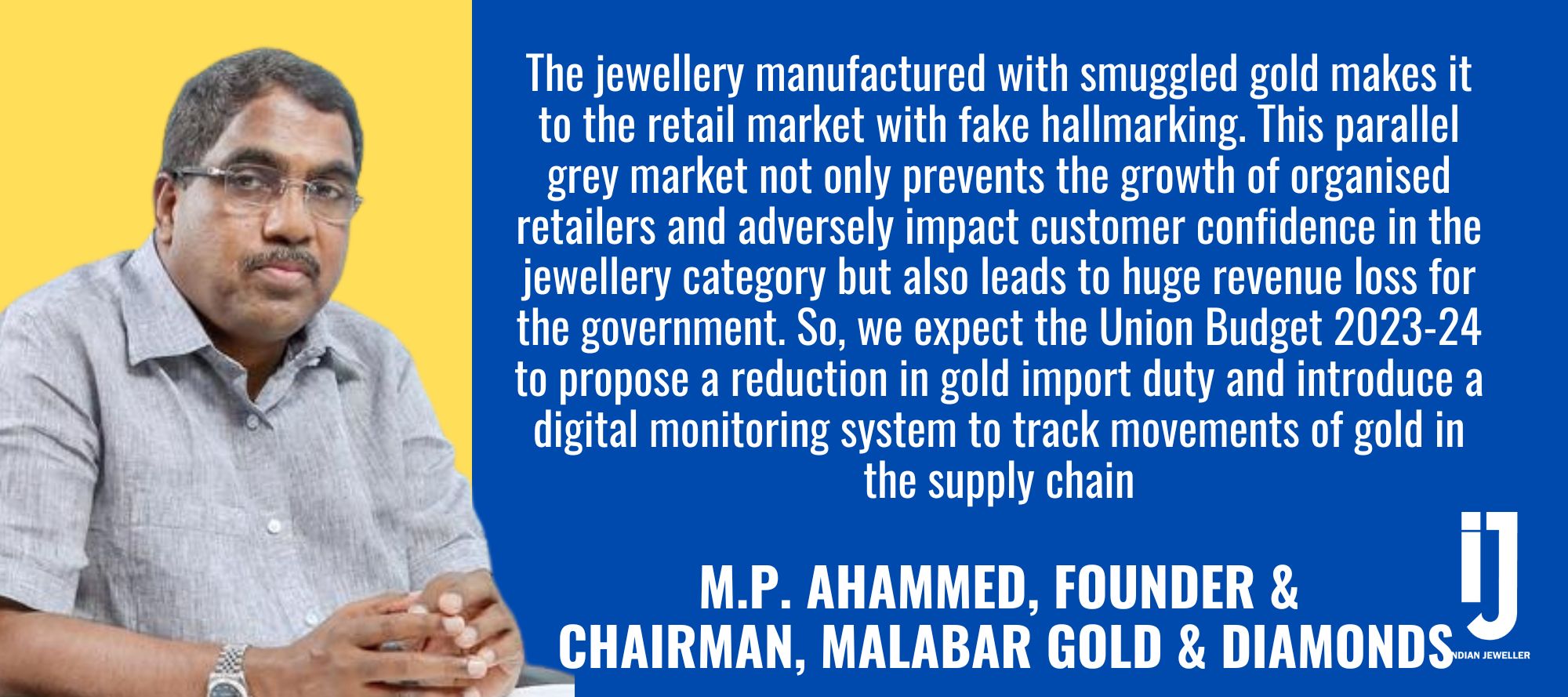
Cut duty on gold, silver and platinum
India needs a robust gold policy which will rationalise gold import duty to curb gold smuggling, boost exports of gems and jewellery and empower organised jewellery retail to capture the domestic gold jewellery demand spectrum with ethically sourced gold, says M.P. Ahammed, founder and chairman, Malabar Gold & Diamonds.
“The higher duty encourages large scale duty evasion and incentivises gold smuggling. Therefore, the jewellers from the organised segment end up losing their competitive edge to a section of jewellers that use smuggled gold to manufacture jewellery. The jewellery manufactured with smuggled gold makes it to the retail market with fake hallmarking. This parallel grey market not only prevents the growth of organised retailers and adversely impact customer confidence in the jewellery category but also leads to huge revenue loss for the government. The government needs to take note of this. So, we expect the Union Budget 2023-24 to propose a reduction in gold import duty and introduce a digital monitoring system to track movements of gold in the supply chain,”says M.P. Ahammed, founder and chairman, Malabar Gold & Diamonds.
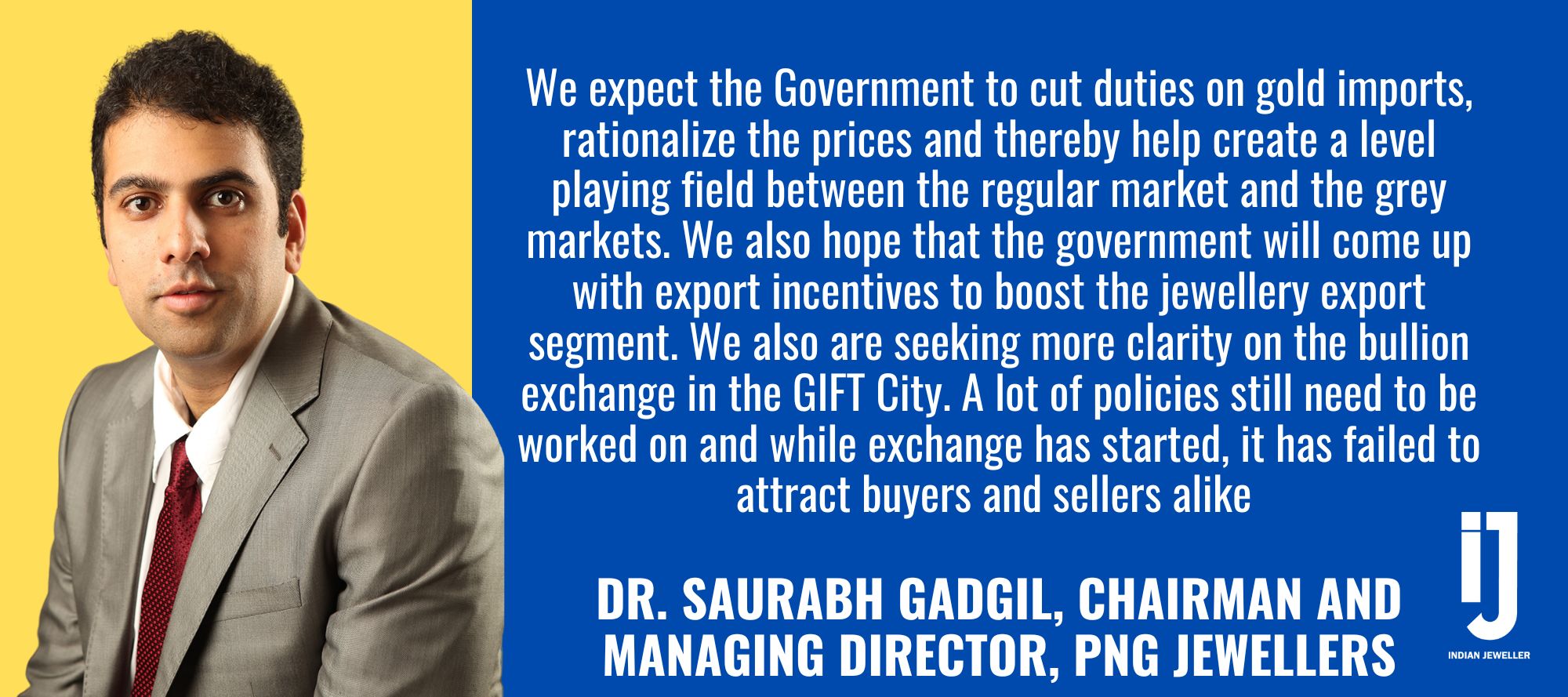
For the jewellery industry, there has been constant conversation between representatives of different trade bodies with the Government of India with respect to the pricing difference of gold between the grey market and the regular market leading to huge disparity and increase in smuggling of gold. “This is primarily due to high import duty rates. Gold is at over 54000 at the moment and the disparity in pricing is close to 4000 rupees for 10 gms in the grey market. For this, we expect and hope that the Government will cut duties on gold imports, rationalize the prices and thereby help create a level playing field between the regular market and the grey markets. Beyond this, we also hope that the government will come up with export incentives to boost the jewellery export segment. We also are seeking more clarity on the bullion exchange in the GIFT City. A lot of policies still need to be worked on and while exchange has started, it has failed to attract buyers and sellers alike. Hence, there is a need for policies that will help increase volumes. On the digital gold side too, there needs to be proper regulations in place for both the jewellers as well as customers to take it seriously,” says Dr. Saurabh Gadgil, Chairman and Managing Director, PNG Jewellers.
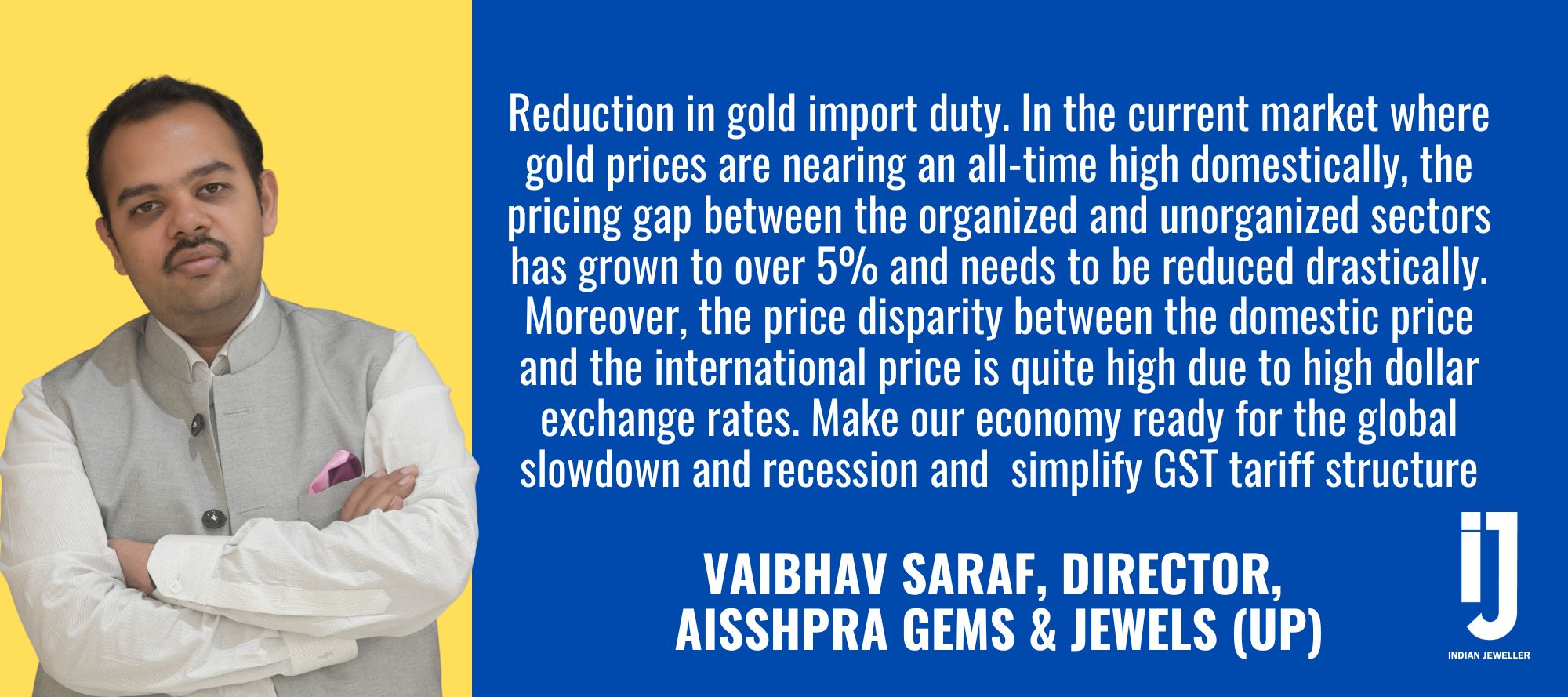
“Reduction in gold import duty. In the current market where gold prices are nearing an all-time high domestically, the pricing gap between the organized and unorganized sectors has grown to over 5% and needs to be reduced drastically. Moreover, the price disparity between the domestic price and the international price is quite high due to high dollar exchange rates,” says Vaibhav Saraf, Director, Aisshpra Gems & Jewels (Uttar Pradesh).

Boosting digitisation and accountability
The jewellery industry in India has the potential to be a major driver of economic growth; the sector benefits from a large and vibrant market driven by strong domestic consumption as well as seasonal demand from the visiting Indian diaspora. With evolving consumer preferences as well as introduction of various regulations such as GST implementation and mandatory hallmarking, there has been rapid formalisation in India’s jewellery industry.
“As we look forward to the Budget 2023, we have a huge opportunity to unlock the true potential of India’s jewellery sector and develop it to become a global leader and trade centre. We believe, with the right policies and support from the Government of India, we can further encourage the industry to become more organised. As an entity built on the principles of trust and transparency, it gives us immense pride to see widespread acceptance of fair-trade practices such as BIS hallmarking, which has eventually empowered consumers across markets.
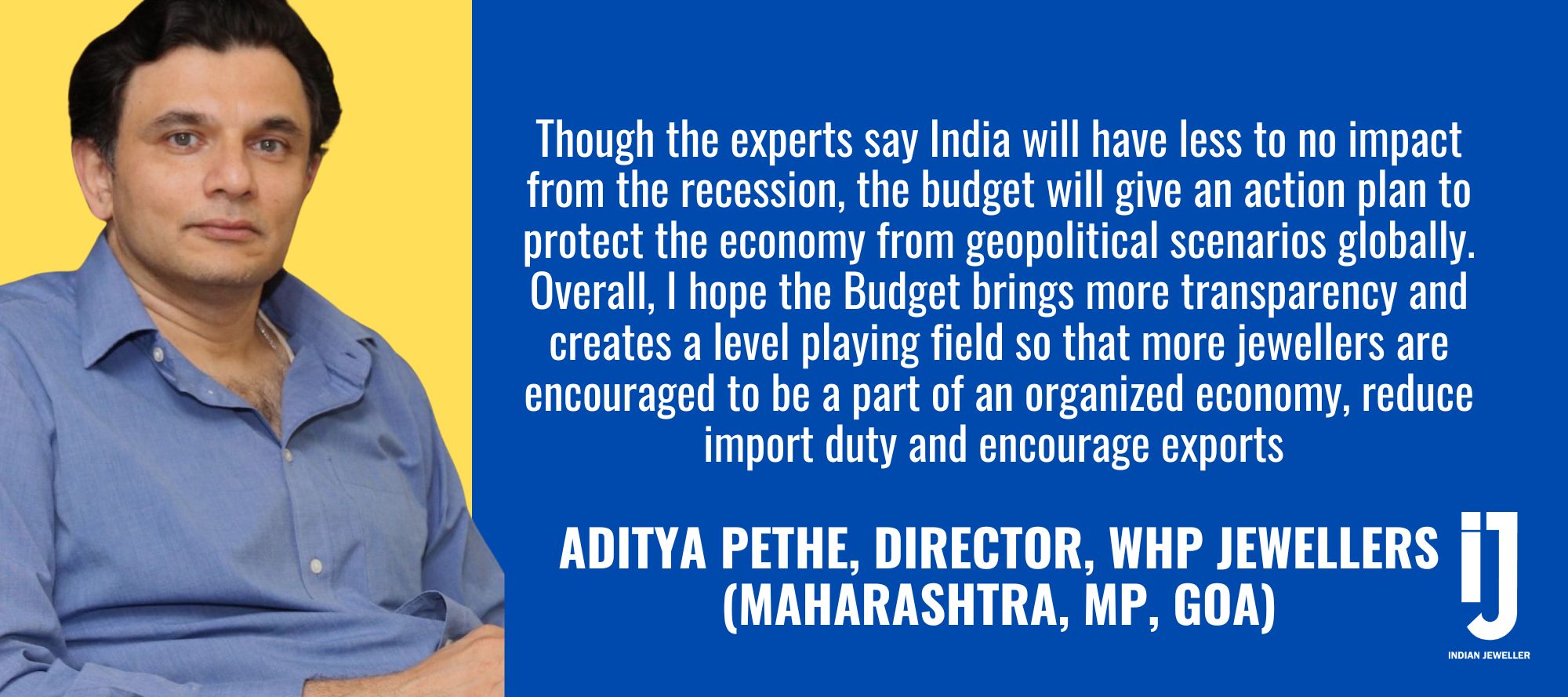
With major infrastructural investments such as the launch of a new jewellery park in Navi Mumbai and expansion of manufacturing facilities in Surat, we are driven towards improving efficiency and bringing in innovation across the sector, through various pioneering initiatives. The formulation of an effective regulatory framework can further boost digitisation in the sector that will eventually increase transparency and accountability,” says – Ramesh Kalyanaraman, Executive Director – Kalyan Jewellers.
Simplifying GST structure
The country along with the jewellery industry is optimistically looking forward to the Union Budget 2023 with the onset of the global recession. “Though the experts say India will have less to no impact from the recession, the budget will give an action plan to protect the economy from geopolitical scenarios globally. Overall, I hope the Budget brings more transparency and creates a level playing field so that more jewellers are encouraged to be a part of an organized economy, reduce import duty and encourage exports,” says Aditya Pethe, Director, WHP Jewellers (Maharashtra, MP, GOA).
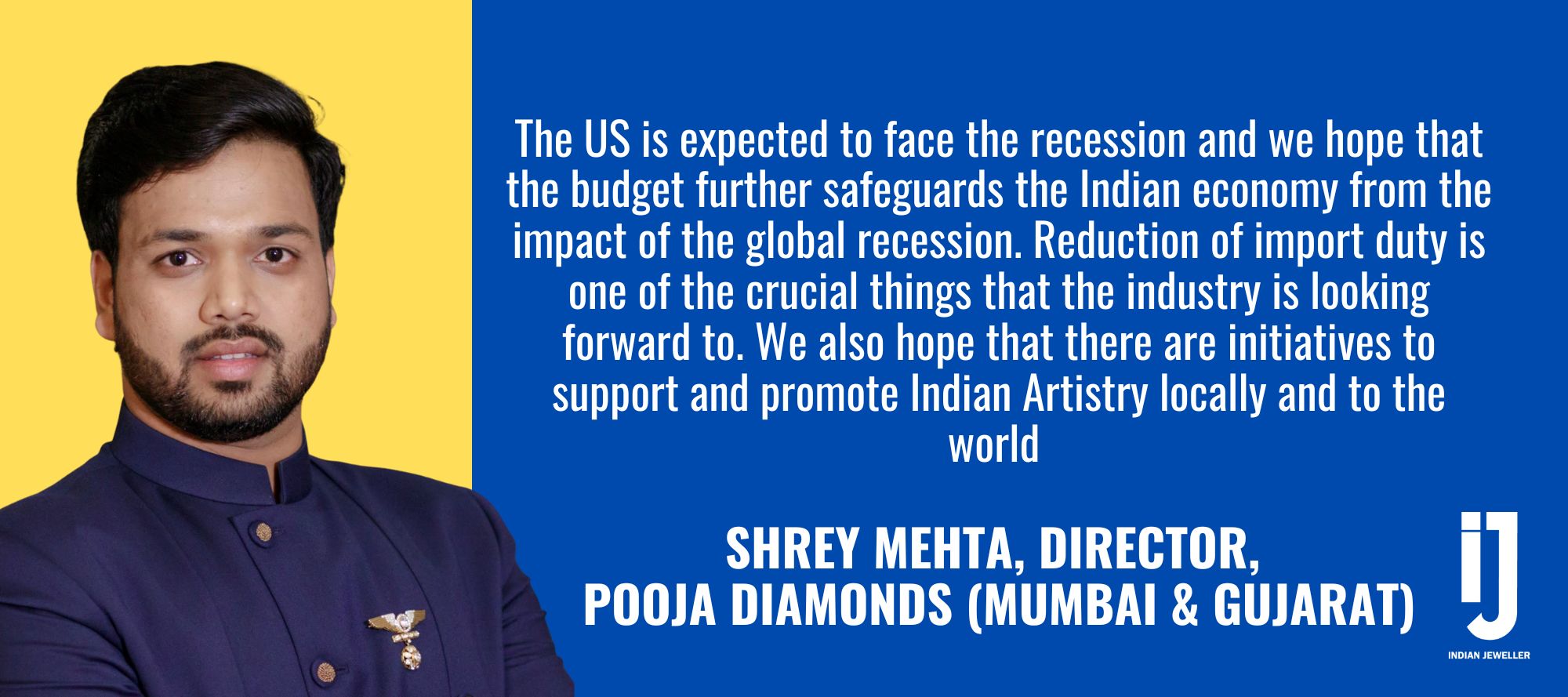
Safeguarding economy from the recession
There is overall positivity in the market and we have experienced a very good wedding and festive season this year. The government's reforms overall have organised and structured the industry quite a lot compared to 10 years ago. “The US is expected to face the recession and we hope that the budget further safeguards the Indian economy from the impact of the global recession. Reduction of import duty is one of the crucial things that the industry is looking forward to. We also hope that there are initiatives to support and promote Indian Artistry locally and to the world,” says Shrey Mehta, Director, Pooja Diamonds (Mumbai & Gujarat).
Be the first to comment